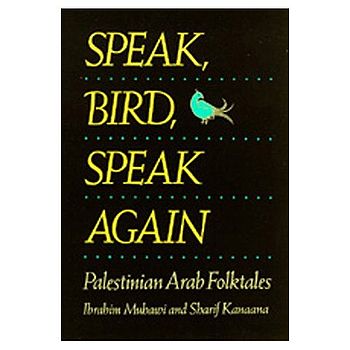
Speak, Bird, Speak Again
Encyclopedia

Palestinian people
The Palestinian people, also referred to as Palestinians or Palestinian Arabs , are an Arabic-speaking people with origins in Palestine. Despite various wars and exoduses, roughly one third of the world's Palestinian population continues to reside in the area encompassing the West Bank, the Gaza...
authors Ibrahim Muhawi and professor of sociology and anthropology at Bir Zeit University Sharif Kanaana.
After the original English book of 1989, a French version, published by UNESCO
UNESCO
The United Nations Educational, Scientific and Cultural Organization is a specialized agency of the United Nations...
, followed in 1997, and an Arabic one in Lebanon
Lebanon
Lebanon , officially the Republic of LebanonRepublic of Lebanon is the most common term used by Lebanese government agencies. The term Lebanese Republic, a literal translation of the official Arabic and French names that is not used in today's world. Arabic is the most common language spoken among...
in 2001.
The book contains a collection of 45 Palestinian folk tales drawn from a collection of two hundred tales narrated by women from different areas of historic Palestine (the Galilee
Galilee
Galilee , is a large region in northern Israel which overlaps with much of the administrative North District of the country. Traditionally divided into Upper Galilee , Lower Galilee , and Western Galilee , extending from Dan to the north, at the base of Mount Hermon, along Mount Lebanon to the...
, the West Bank
West Bank
The West Bank ) of the Jordan River is the landlocked geographical eastern part of the Palestinian territories located in Western Asia. To the west, north, and south, the West Bank shares borders with the state of Israel. To the east, across the Jordan River, lies the Hashemite Kingdom of Jordan...
, and Gaza
Gaza
Gaza , also referred to as Gaza City, is a Palestinian city in the Gaza Strip, with a population of about 450,000, making it the largest city in the Palestinian territories.Inhabited since at least the 15th century BC,...
). The stories collected were chosen on the basis of their popularity, their aesthetic and narrative qualities, and what they tell about popular Palestinian culture dating back many centuries. The authors spent 30 years collecting the material for the book.
The English version of the book is studied as part of literature courses at both University of California at Berkeley and Chicago University, and Kana'nah himself taught the study of the book in the masters programs at Bir Zeit University.
Some of the folk tales from Speak, Bird, Speak Again have been used in other collections/books:
- Margareth Read MacDonald, Alik Arzoumanian (ill), (2006): Tunjur! Tunjur! Tunjur! A Palestinian Folktale, ISBN 978 0 7614 5225 6, is based on the "Tunjur, Tunjur" story, first told by Fatme Abdel Qader, Arrabe, Galilee, for Speak, Bird, Speak Again.
- Sonia Nimr (Introduction by Ghada KarmiGhada KarmiGhada Karmi is a Palestinian doctor of medicine, author and academic. She writes frequently on Palestinian issues in newspapers and magazines, including The Guardian, The Nation and Journal of Palestine Studies...
), (2007): Ghaddar the Ghoul and other Palestinian Stories, ISBN 978 1 84507523 1, contains the story "Hasan and the Golden Feather", which is based on the story entitled "Bushel of Gold" (or "The Golden Pail") in Speak, Bird, Speak Again.
Controversy
In 2007 the HamasHamas
Hamas is the Palestinian Sunni Islamic or Islamist political party that governs the Gaza Strip. Hamas also has a military wing, the Izz ad-Din al-Qassam Brigades...
-run Palestinian Authority (PA) banned the book and issued a directive to pull Professor Kanaana's book from school libraries and destroy it, however, the ban was later lifted. The book was misinterpreted, explained the author, "since it was not meant to be taught to children, as it is taught at the masters and doctorate level [in literature studies]."
The Palestinian novelist Zakariya Mohammed warned that Hamas' decision to ban the book, which is a collection of 45 folk tales, was "only the beginning" and he urged intellectuals to take action. He said: "If we don't stand up to the Islamists now, they won't stop confiscating books, songs and folklore".

